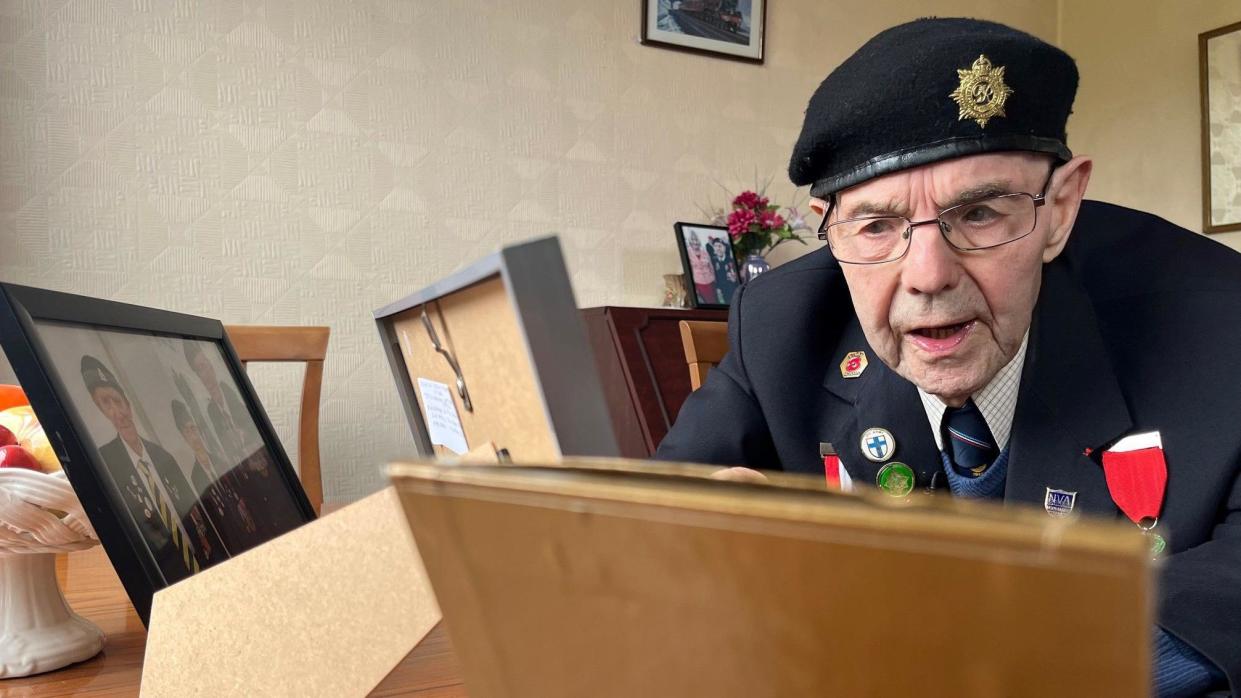'I wouldn't have missed it' - Normandy veteran

On 6 June 1944, Allied forces landed on the beaches of northern France, marking the beginning of the liberation of Europe from the Nazis. Ahead of the 80th anniversary, BBC News went along to visit Cliff Dalton - one of the last survivors of the Normandy landings.
With a trembling hand, Cliff Dalton picks up a framed photograph showing a fresh-faced man in Army uniform.
"I look smart," he says, lost in the image; a 98-year-old face reflecting back off the glass frame.
"I wouldn't have missed it. I am proud."
On his jacket lapels, around his gleaming medals, are badges commemorating other key D-Day anniversaries. He is about to add another.
Mr Dalton was 18 when he landed on Gold Beach, at Arromanches in Normandy on 10 August 1944 - two months after D-Day.
A few months earlier he had joined the Royal Army Service Corps.
He tells me he could have delayed his call-up on account of him being an apprentice vehicle electrician, but he was "bored" and hankered after adventure.
Mr Dalton was training in Southend, Essex, when the first waves - including men from his home city of Hull who served with the 2nd Battalion East Yorkshire Regiment - stormed the beaches.
"We were all talking about it," recalls Mr Dalton, who is believed to be East Yorkshire's last remaining Normandy veteran.
He knew his turn was coming.

Mr Dalton has vivid recollections of boarding a troop ship at Southampton bound for Normandy.
"It was a very hot day," he says. "We were full of stuff on our backs - a rifle, steel helmet, respirator, mess tins, a back pack...and to top it all, at Southampton, just as you left, they threw 50 rounds of ammunition around your neck."
He claims he "didn't have time to be scared", adding, with a grin: "You have too much on your plate."
Arriving in Normandy, he recalls the Mulberry harbours - floating artificial harbours designed and constructed by British military engineers.
"There was an officer shouting orders," says Mr Dalton. "He was shouting, 'come on, hurry up! Get down on to the landing stage'.
"As soon as we stepped foot on shore, we didn't stop. We kept on going - getting a move on, you would say."
Mr Dalton, along with others, deployed as reinforcements following D-Day. Immediately after landing, they marched four miles inland to a camp, where he found his unit, 318 Company.
"I was in the mobile workshops," he says. "We maintained about 200 of the company's vehicles, which were supplying the frontline."
His unit were often on the move, he remembers.
"We would set up the workshops and then we would get the order, 'pack up - we're moving'."
In the days and weeks after D-Day, huge volumes of men and equipment were brought ashore, assisting the main fighting force.
Mr Dalton remembers: "Tanks would come by, churning up the roads. I remember that."
His company pushed through France, Belgium, Holland and eventually Germany, where an image he treasures was taken.
It shows Mr Dalton and his friends perched on a V2 rocket - one of Hitler's most feared and technologically-advanced weapons.
"I'd never seen anything like it before," he says. "The front end was damaged.
"Our sergeant took this photograph of us all sitting on the rocket and gave us all a two-inch copy to keep. It's pretty unique."
'Very grateful'
After the war, Mr Dalton met and married wife Jean. They were married 53 years, before Mrs Dalton died in 2005. They had two sons together, Philip, 62, and Keith, 64.
In 1985, Mr Dalton joined the Hull branch of the Normandy Veterans' Association after seeing an advert in a local newspaper.
Over the years he joined other veterans on visits back to the beaches.
"Some of them [other veterans] were a lot older than me," he says. "They were involved earlier [D-Day] than me so I kept quiet. They would tell you what went on."
Now, with those veterans mostly lost to time, Mr Dalton has picked up the baton; determined to ensure the Normandy story continues to be told.
"Our association always said we'd carry on - the last person will turn off the lights."
Returning to the photo, now back in his hand, Mr Dalton tells me how he feels about being one of the few left standing.
"I'm very grateful. I can't understand how I've done it," he says.
Follow BBC East Yorkshire on Facebook, X (formerly Twitter) and Instagram. Send your story ideas to eastyorkslincs.news@bbc.co.uk


